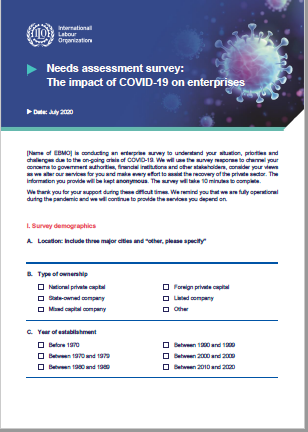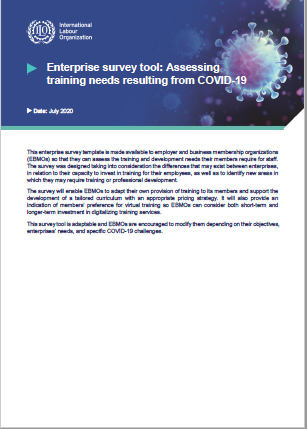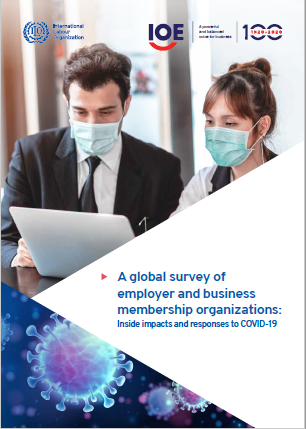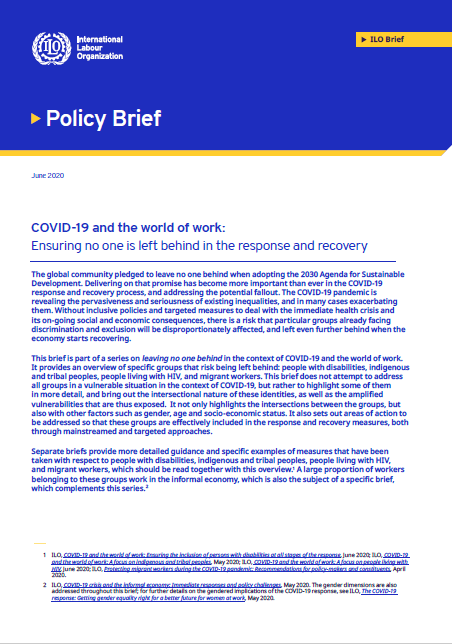-

Policy brief
26 August 2020
Against the background of the Covid-19 pandemic, most countries have re-opened their economy and workers have been requested to return to their workplace. The present Brief highlights the need for social dialogue in order to ensure a safe return to work. It also illustrates a number of practical examples from across the globe where this return was prepared through bipartite or tripartite consultations, at the national, sectoral or enterprise level.
-

COVID- 19
03 August 2020
This survey tool has been developed by the ILO Bureau for Employers’ Activities (ILO-ACT/EMP) to help employers and business membership organizations (EBMOs) evaluate the needs of enterprises as a result of on-going COVID-19 crisis. This survey tool is an update to the first one released in March 2020 (see here) and assists EBMOs gain membership insights by assessing priorities and challenges enterprises are facing due to the prolonged crisis situation.
-

COVID- 19
22 July 2020
This enterprise survey template is made available to employer and business membership organizations (EBMOs) so that they can assess the training and development needs their members require for staff. The survey will enable EBMOs to adapt their own provision of training to its members and support the development of a tailored curriculum with an appropriate pricing strategy. It will also provide an indication of members’ preference for virtual training so EBMOs can consider both short-term and longer-term investment in digitalizing training services.
-

COVID-19 and the world of work
16 July 2020
As economies restart, there is an opportunity to develop public and private policies to address the current climate change crisis gradually and foster the transition to a green economy. The reconstruction of the economic fabric should lay the foundations for environmentally sustainable and socially inclusive production and consumption as we move into the future.
-

COVID- 19
29 June 2020
In a joint effort to understand the real demands and challenges EBMOs are facing,
the International Labour Organization – Bureau for Employers’ Activities (ILO-ACT/EMP) and the International
Organisation of Employers (IOE) conducted a global survey of EBMOs. This rich information base, enables to assess the most pressing needs of EBMOs.
-

Publication
09 June 2020
This brief is part of a series on leaving no one behind in the context of COVID-19 and the world of work.
It provides an overview of specific groups that risk being left behind: people with disabilities, indigenous
and tribal peoples, people living with HIV, and migrant workers.
-

COVID-19: Relying on social dialogue for solutions
21 May 2020
What can governments, employers and workers do to help fight Covid-19? They can work together. The ILO calls this cooperation between representatives of governments, employers’ and workers’ organizations social dialogue.
-

COVID- 19
18 May 2020
This guide has been developed by the International Labour Organization Bureau for Employers’ Activities (ILO-ACT/EMP) to assist EBMOs to provide practical guidance to member companies that have implemented “working from home” protocols for their staff in 2020 as an alternative temporary arrangement during the COVID-19 crisis.
-

COVID- 19
07 May 2020
This Guide has been developed by the ILO Bureau for Employers’ Activities (ILO-ACT/EMP) and contains recommendations for health and safety practices and approaches to COVID-19 prevention.The publication aims to provide general guidance and information to employers on how to prevent the spread of COVID-19 in the workplace, to enable workers to return to work safely while keeping the risk of contamination as low as possible. It also provides ideas on how to protect workers’ mental well-being during the pandemic.
-

Policy brief
05 May 2020
The COVID-19 pandemic with its far reaching socio-economic consequences calls for effective tripartite social dialogue and cooperation bringing together governments and employers’ and workers’ organizations to design effective strategies and policies to address its impacts.









